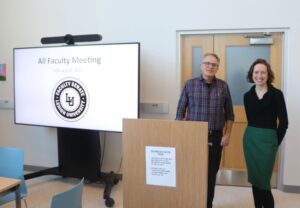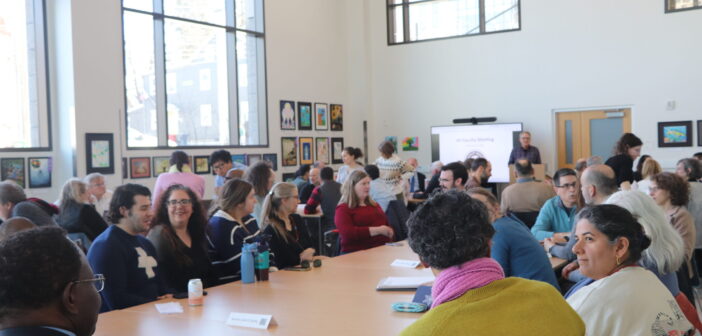Lehigh’s Faculty Senate hosted its annual all-faculty meeting on Friday to address concerns regarding recent actions by the federal government and their impact on the university.
The meeting opened with small group discussions in which faculty members deliberated revisions to the faculty code of ethics, voting rights for term faculty, criteria for promotions, and service load and equity. Peter Zeitler, faculty senate chair, and Jenna Lay, faculty senate vice chair, then led a broader conversation on these topics.
The code of ethics outlines faculty members’ rights and responsibilities, including a commitment to “a diverse and inclusive campus community.”
Faculty members collectively agreed at the meeting that upholding the faculty code of ethics is increasingly important in today’s climate, and all faculty members should demonstrate a strong commitment to it.
The senate also debated whether revisions to the code of ethics are necessary. The members concluded that while updates may be considered, the code must be respected regardless.
“I think it’s important for us to remember that we are a living institution,” Lay said. “We might put things into place that eventually need to change over time as we learn more and test things out.”
During the second half of the meeting, the faculty discussed strategies to protect the university from federal policies which could negatively impact higher education.
Zeitler said recent policy changes in Washington, D.C., particularly under the Trump administration, have threatened universities nationwide, including Lehigh.
The Trump administration recently implemented funding cuts for diversity, equity and inclusion programs at universities, and reduced funding for biomedical research. According to the New York Times, these cuts have led to serious repercussions to research conducted by National Institutes of Health and research universities.

Faculty Senate Chair Peter Zeitler and Vice Chair Jenna Lay led the meeting on Friday. The next meeting will be on March 7. (Avery Folmar/B&W Staff)
“You can characterize this as an attack on higher education,” Zeitler said. “(It’s) not just an attack on funding, but also an attack on how research universities fundamentally work.”
He also said there has been a strong emotional response across the faculty board regarding these policies.
Seth Moglen, a professor of English, said the threat of significant funding cuts, which could severely affect the institution, is being used as a tactic to discredit entire domains of science.
“We cannot allow our fear of defunding to intimidate us from making a case that has to be made,” Moglen said.
Faculty members proposed ways to professionally address these issues while working to protect Lehigh’s programs, departments and research.
On Feb. 13, Lehigh was designated an R1 research university by Carnegie Classification. Faculty members who collaborate with students on research projects emphasized the importance of preserving research and maintaining the university’s research status at the meeting.
Haiyan Jia, an associate professor of journalism and communications, said the university must provide internal support to sustain research, especially in a time when external funding is precarious.
Faculty members also expressed concerns about supporting students who worry about potential cuts to their academic programs and finding jobs in their respective fields after graduation.
“We absolutely have to think about the ways in which this administration is affecting our students’ personal and academic lives,” Lay said. “When students feel attacked in their identities, it affects their academics.”
Lee Bauknight, a professor of English, highlighted the concerns about the future of diversity, equity and inclusion initiatives among graduate students teaching first-year writing courses, many of whom are “heavily invested in social justice.”
This prompted conversation about how faculty can address ethics, misinformation and differing opinions in the classroom.
Faculty members discussed what professors should and shouldn’t be allowed to say to their students regarding politics. Ultimately, they largely agreed to refrain from discussing the current presidential administration with students unless relevant to their curriculum.
Lay said although faculty members can teach students the “best knowledge of their fields,” their work is often politicized.
Despite federal-level decisions, several faculty members emphasized Lehigh’s core values have remained unchanged.
Many said they are prepared to take action to protect their research and students from potential adverse effects of federal policies in the immediate future.
The next faculty senate meeting will be held on March 7. The agenda for past meetings can be found on the Faculty Senate website.






Comment policy
Comments posted to The Brown and White website are reviewed by a moderator before being approved. Incendiary speech or harassing language, including comments targeted at individuals, may be deemed unacceptable and not published. Spam and other soliciting will also be declined.
The Brown and White also reserves the right to not publish entirely anonymous comments.